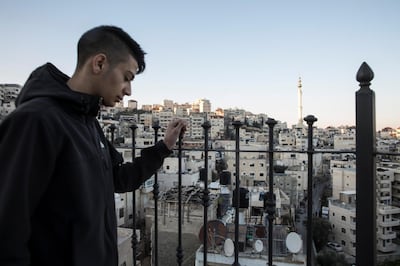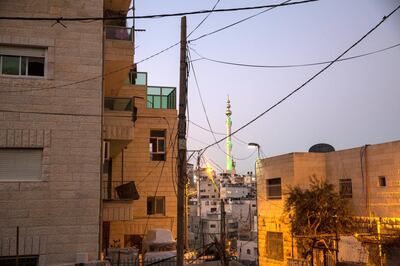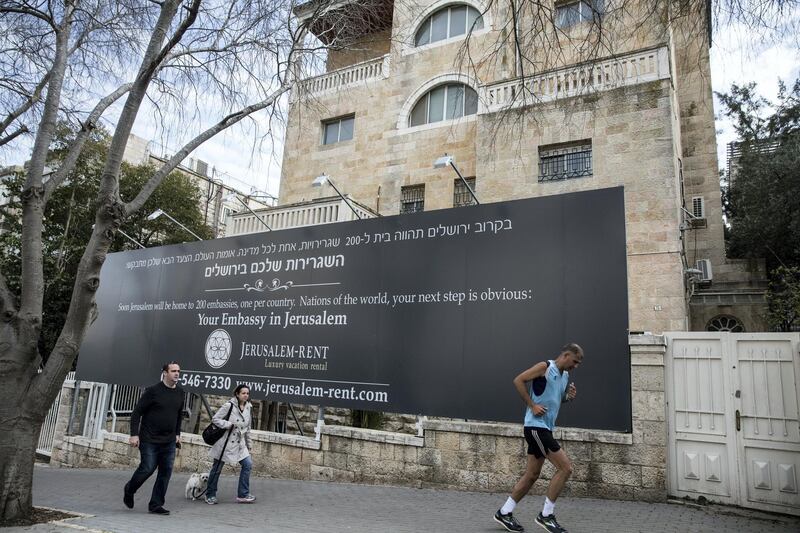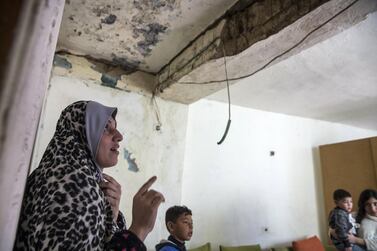The day the Trump administration announced in December 2017 that it would be moving the United States Embassy to Jerusalem, Yehiya Derbas’ life changed forever.
Like many in Isawiyah, a hardened and impoverished East Jerusalem neighborhood, Derbas, then a slight 16-year-old, joined in Palestinian protests against the move. And like many young men before and after him, Mr Derbas told The National that Israeli forces shot him and later imprisoned him for one year on charges related to the day's violence.
Upon his release in early February, now marked as an ex-con, Mr Derbas returned to a city that in most ways has remained the same day-to-day – but that intangibly has significantly changed.
“On the ground, Jerusalem was divided before the move of the embassy and it was unsustainable,” said Daniel Seidemann, an Israeli expert on Jerusalem. “None of that has changed.”

What has changed, Palestinian and Israeli analysts told The National, is that the balance of power has now tipped widely in Israel's favour, providing a clear path forward for Israel to accelerate its dominance over the disputed city at the expense of Palestinian residents.
“What Israel has long wanted to do is to turn Palestinians into being a minority group and not their own people with their own representation and political leadership,” said Diana Buttu, a former spokesperson for the Palestinian Liberation Organisation. “This [American] administration has just said we don't really care what's happening.”
The new US Embassy is the most physical embodiment of these changes – and what hasn't changed. For now, the US has put off building an entirely new complex, which is costly and time consuming. Instead, it has repurposed one of the city's two US Consulate buildings into a temporary embassy, which has become a popular tourist site, particularly among Evangelical Christians. Tel Aviv staff members, meanwhile, have not yet relocated to Jerusalem, though US Ambassador David Friedman often stays over in a hotel in Jerusalem. (Mr Friedman also personally owns property in Jerusalem.)
Signs around town, however, advertise new properties for embassy staffers – raising the pressure on other embassies to make the move now, or risk losing out in an already competitive and expensive housing market.
The move has “emboldened other states to break with international consensus and international law,” said Yara Hawari, a fellow at Al Shabaka, the Palestinian Policy Network. “It’s so precarious for Jerusalemites. It’s so anxiety inducing.”
The State Department has also notably downgraded its diplomatic mission to the Palestinians, moving it from a separate function of the US Consulate in Jerusalem to now being directly under the jurisdiction of the US Embassy.

So far no politically powerful countries have followed America’s lead to Jerusalem. But Ms Buttu said that even diplomatic acceptance of the new embassy is a big break from before.
“While counties around the world have said that they are not switching their own policies, in effect they are recognising the embassy move,” said Ms Buttu. “So for example the US embassy in Jerusalem hosts events and consulates are showing up to these events. And that’s a change from the past.”
Although many Palestinians were already disillusioned with American foreign policy, Mr Trump’s approach “was a blow to those committed to a two-state paradigm,” said Ofer Zalzberg of the International Crisis Group. “It decreased the perspective that the conflict can be resolved because basically Palestinians are in the view that there is no point in having a Palestinian state without East Jerusalem as the capital and Trump is seen as rejecting that.”
The day after the embassy's inauguration, the Israeli government approved a plan to build a cable car in the Old City, which runs through contested areas and will end at a tourist site being developed by a Jewish settler organisation.
“It’s not that the Israeli officials didn’t have this in mind earlier, but they advanced it while enjoying strong American support,” said Mr Zalzberg.
At the same time, in the immediate aftermath of the move last May, analysts and pundits speculated that the Palestinian street would erupt in violence in Jerusalem. Mr Seidemann criticised this kind of thinking as only perpetuating a skewed perspective on Palestinians, their interest, and the political situation.
“People come to us and said where is all of the convulsive violence that you promised us if the embassy moved, almost disappointed that it didn’t take place,” he recalled.
Instead, “Jerusalem was rather calm. That is not surprising as there is a sense after the embassy move that the Arab world did not stand sufficiently by the Palestinians and the Palestinian claims to Jerusalem.”
Still, like many, Mr Seidemann said it’s too soon to really know exactly how this will play out.
“That has generated an unprecedented sense of hopelessness on the Palestinian side,” he said. “Hopelessness is the great destabiliser. It’s measured in months and years and not days and weeks.”
If Mr Derbas is grappling with hopelessness, he didn’t want to talk about it. He spends much of his day now in his family home, a sixth-floor walk-up where the electricity periodically goes out because of shoddy construction. He’s not returning to school and hasn’t yet found a job. Prison hardened him, he said, and made him more aware.
The way he saw it, both his personal prospects and the situation in Jerusalem were now worse off since the embassy move. But it still wasn’t clear exactly where this all would lead.






